
United Nations: The United Nations’ Mideast envoy briefed the Security Council behind closed doors Wednesday at the request of Kuwait and Bolivia on what Palestinian Ambassador Riyad Mansour called the “catastrophic” humanitarian situation in the Gaza Strip.
Bolivian Ambassador Sacha Llorentty Soliz said Nikolay Mladenov, the special coordinator for the Middle East peace process, told the council that drinking water is short, hospitals have been closed and “doctors stopped doing surgeries.” Mladenov also cited Gaza’s 47 per cent unemployment rate, rising to 60 per cent for young people, he said.
Llorentty Soliz said he highlighted that the situation in Gaza has been worsened by the US suspension of millions of dollars in funding for the UN agency for Palestinian refugees.
Palestinians say this is a blackmail tactic by the US to pressure them to negotiate an unfair peace initiative being pushed by US President Donald Trump.
The UN Relief and Works Agency for Palestinian Refugees, known as UNRWA, was notified Jan. 16 that the US was withholding $65 million of a planned $125 million installment.
Llorentty Soliz said he told the council the primary responsibility for “the catastrophic situation in Gaza” rests with Israel due to its crippling land, air and sea siege on the enclave.
Mansour said Palestinian President Mahmoud Abbas will address the Security Council on Feb. 20 on the situation of all Palestinians and will ask members to implement UN resolutions “to end the occupation that started in 1967, to allow for the independence of the state of Palestine, and therefore to save the two-state solution.”
Since the mid-1990s, several US-mediated rounds of Israeli-Palestinian negotiations on setting up a Palestinian state alongside Israel have ended in failure.
Gaps in positions only widened in the past decade as Israeli colony expansion continued and the Palestinians failed to end a crippling political split between Hamas and Abbas’ internationally backed self-rule government in parts of the West Bank.
The gap has widened even further since Dec. 6 when Trump unilaterally recognised Occupied Jerusalem as the capital of Israel drawing international condemnation.
The Palestinians want East Jerusalem as the capital of an independent Palestine and Abbas said Trump’s action ruled out the United States as a mediator for peace.












